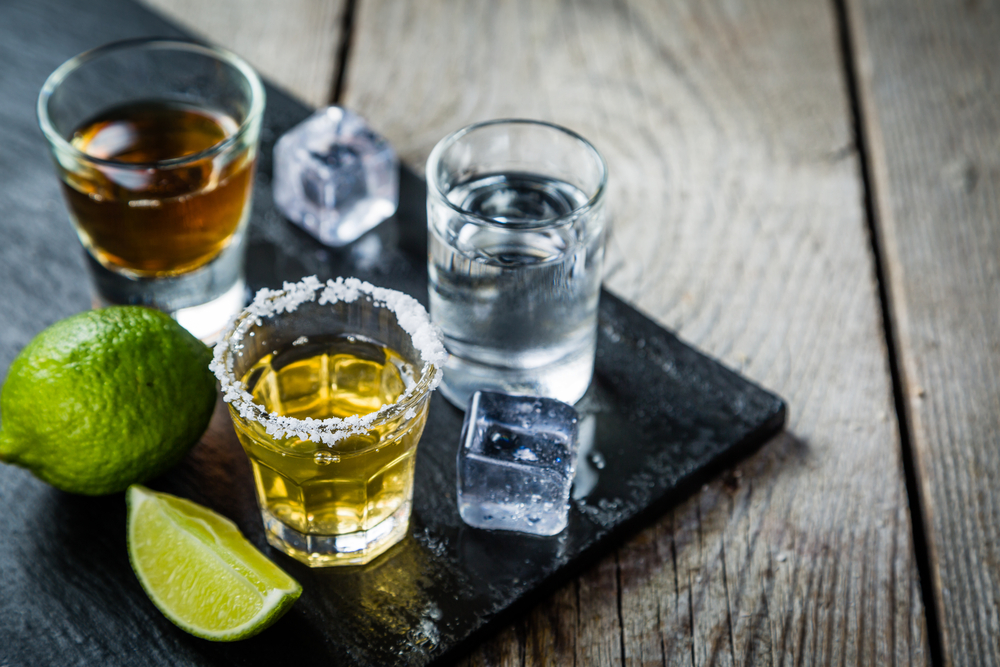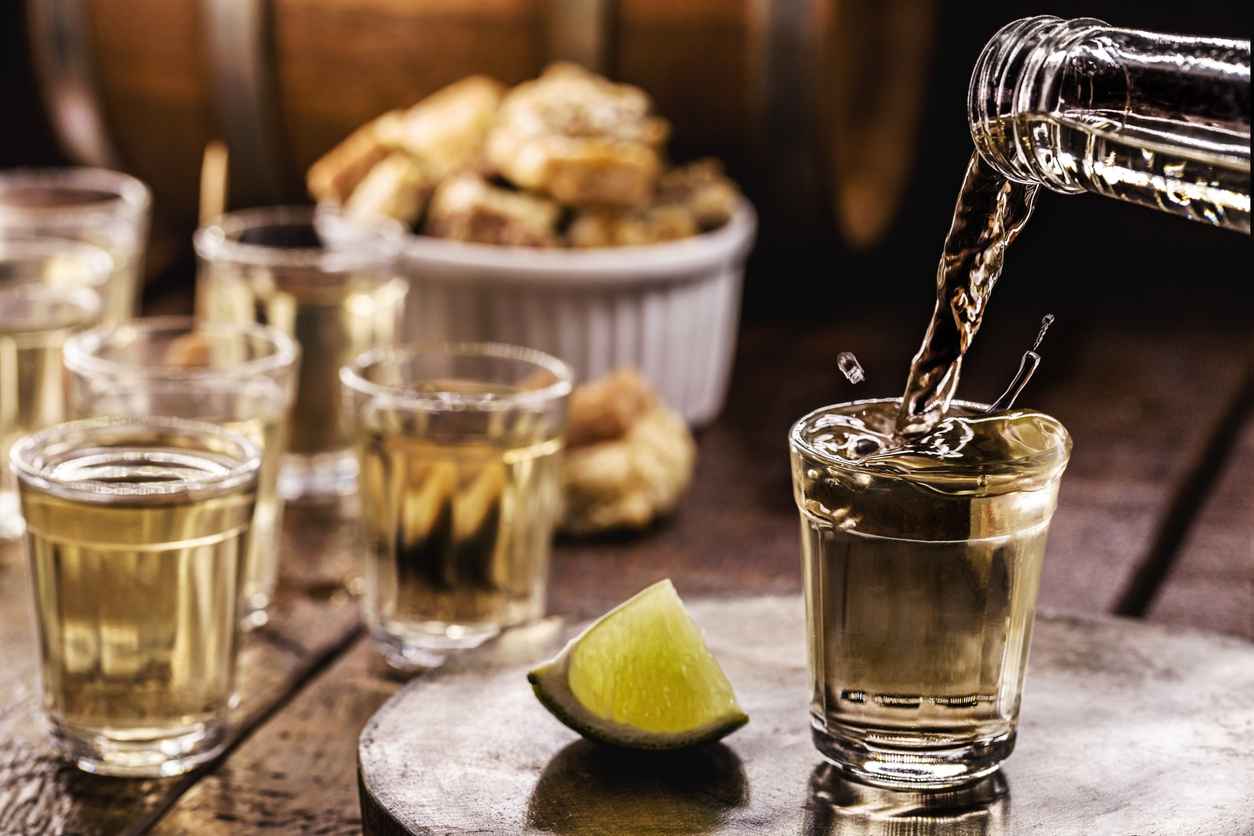Understanding Tequila As A Type Of Alcohol

Tequila is a distilled beverage that originates from Mexico. It is made from the blue agave plant and undergoes a complex fermentation and distillation process. Tequila is known for its unique flavor profile, ranging from earthy and herbal to sweet and citrusy. With an alcohol content typically ranging from 35% to 55%, it falls into the category of strong spirits. Contrary to popular belief, tequila is not classified as an upper or stimulant. It is important to understand tequila as a type of alcohol and its effects on the body to make informed choices when consuming it.
Tequila As A Distilled Beverage
Tequila is a distilled beverage that is produced from the blue agave plant. It undergoes a meticulous fermentation and distillation process to achieve its unique flavor profile. The blue agave plant is harvested, cooked, crushed, fermented, and then distilled to create tequila. This process gives tequila its distinctive characteristics and sets it apart from other spirits. Tequila is not simply a fermented beverage; instead, it goes through an additional distillation step that further refines its flavors and increases its alcohol content. This distillation process is an integral part of tequila production, ensuring a high-quality and flavorful spirit.
Types Of Tequila And Alcohol Content
There are several types of tequila, each with its own unique characteristics and alcohol content. The two main categories are 100% agave tequila and mixto tequila. 100% agave tequila is made purely from the blue agave plant, while mixto tequila contains a minimum of 51% agave and can be combined with other sugars. The alcohol content of tequila typically ranges from 35% to 55%, with the most common being around 40% alcohol by volume (ABV). However, there are also higher proof tequilas available, which can have an alcohol content of up to 55%.
How Alcohol Affects The Body

Alcohol affects the body in a variety of ways. When consumed, alcohol is absorbed into the bloodstream and travels to the brain, where it depresses the central nervous system. This leads to a decrease in brain function, resulting in impaired coordination, slowed reaction times, and altered judgment. Alcohol also affects other organs, such as the liver, by causing inflammation and potentially leading to long-term damage. Additionally, excessive alcohol consumption can lead to dehydration, increased heart rate, and a weakened immune system. It is important to drink alcohol in moderation and be aware of its effects on the body.
Short-term Effects Of Alcohol Consumption
Short-term effects of alcohol consumption can vary depending on the individual and the amount of alcohol consumed. Common short-term effects include:
- Impaired coordination and motor skills
- Slowed reaction times and reflexes
- Altered judgment and decision-making abilities
- Euphoria and reduced inhibitions
- Increased heart rate and blood pressure
- Nausea and vomiting
- Headaches and hangovers
It’s important to remember that these effects can impair one’s ability to drive or operate heavy machinery, leading to accidents and injuries. Drinking alcohol in moderation is key to avoiding these short-term effects and maintaining overall health and safety.
Long-term Effects Of Alcohol Consumption
Long-term alcohol consumption can have detrimental effects on the body. Excessive drinking over an extended period can lead to liver damage, including alcoholic hepatitis, liver cirrhosis, and even liver cancer. Other long-term effects include increased risk of cardiovascular diseases, such as high blood pressure and stroke, as well as digestive issues like gastritis and pancreatitis. Prolonged alcohol abuse can also have a negative impact on mental health, leading to increased risk of anxiety disorders, depression, and cognitive impairment. It is important to understand the potential long-term consequences of alcohol consumption and to drink responsibly to maintain overall health and well-being.
Tequila’s Influence On Emotions And Behavior
Tequila’s influence on emotions and behavior is a topic of interest for many people. Tequila, known for its association with celebration and fun, has been believed to have a different effect on mood compared to other alcoholic beverages. However, scientific evidence disproves this myth, showing that tequila has the same effects as other alcohol. It is important to recognize that individual experiences with tequila may vary, and factors such as personal mindset and expectations can play a role in the perceived emotional and behavioral effects. Responsible tequila consumption is always recommended to maintain a healthy relationship with alcohol.
Tequila’s Impact On Mood
Tequila’s impact on mood is often associated with feelings of excitement and happiness. However, it is important to recognize that these perceived effects are not specific to tequila and can be attributed to the general effects of alcohol. Tequila, like other alcoholic beverages, acts as a depressant on the central nervous system, resulting in relaxation and decreased inhibitions. Individual experiences with tequila may vary, depending on factors such as mindset, surroundings, and personal expectations. It is crucial to consume tequila responsibly and be aware of its potential effects on mood and behavior.
Tequila And Aggression Levels
Research has shown that tequila can potentially increase aggression levels in individuals. The presence of alcohol in tequila affects the brain’s neural pathways and can lead to disinhibition and impulsive behavior. This can result in heightened aggression and a decrease in self-control. However, it is important to note that the relationship between tequila and aggression is not the same for everyone. Factors such as individual tolerance, mindset, and external circumstances can influence how tequila affects aggression levels. It is essential to drink responsibly and be aware of the potential impact of tequila on one’s behavior.
Debunking Tequila As An Upper
Despite the popular belief, tequila is not an upper. It is important to debunk this myth and understand the true effects of tequila. While tequila is known for its energizing and euphoric qualities, these effects are not due to the tequila itself being a stimulant. Rather, it is the alcohol content in tequila that causes these reactions. Tequila is an alcoholic beverage that should be consumed responsibly, just like any other alcoholic drink. It is crucial to understand the true nature of tequila and make informed choices when consuming it.
Common Misconceptions About Tequila

Tequila, like many alcoholic beverages, is surrounded by common misconceptions. One prevailing myth is that tequila is a stimulant. This belief stems from the energizing and euphoric effects that some people experience when consuming tequila. However, these effects are not due to tequila itself being a stimulant, but rather the alcohol content in the beverage. Another misconception is that tequila makes you feel more lively and extroverted. While alcohol can lower inhibitions, it is important to remember that individual reactions to tequila can vary, and excessive consumption can lead to negative outcomes. It is vital to approach tequila with moderation and responsible drinking habits.
Clarifying Tequila’s Classification In Relation To Uppers And Downers
Tequila, like all alcoholic beverages, is classified as a depressant or “downer”. This categorization is based on its ability to slow down brain activity and the central nervous system. Despite popular misconceptions, tequila does not possess any stimulant properties that would classify it as an “upper”. It is important to understand that the effects of tequila are primarily a result of the alcohol content, which can vary depending on the type and strength of the tequila. Therefore, it is crucial to consume tequila responsibly and in moderation, as excessive alcohol intake can have negative consequences on both physical and mental health.
Comparing Tequila To Other Alcoholic Beverages
When comparing tequila to other alcoholic beverages, it’s important to consider the differences in effects and characteristics. While tequila is often associated with energetic and festive occasions, it is worth noting that the effects of alcohol itself are similar across different types of drinks. However, the specific type of alcohol and additional ingredients or mixers used in different beverages can contribute to variations in taste, intensity, and potential side effects. It’s crucial to drink responsibly and be aware of one’s alcohol tolerance, regardless of the type of alcoholic beverage being consumed.
Tequila Vs. Vodka Vs. Whiskey: Differences In Effects

When comparing the effects of tequila, vodka, and whiskey, there are some notable differences to consider.
Tequila is often associated with energizing and festive occasions, thanks to its reputation as a party drink. It is known to provide a euphoric and uplifting feeling due to its unique characteristics and the presence of certain compounds.
Vodka, on the other hand, is a neutral spirit that is known for its smoothness and versatility. It tends to have a more calming and sedative effect, often associated with relaxation and socializing.
Whiskey, with its complex flavor and higher alcohol content, can have a more intense impact on the body. It is often associated with feelings of warmth and a slower, more contemplative experience.
Overall, the different effects of these drinks can be attributed to their unique compositions, alcohol content, and individual reactions to them. It’s important to drink responsibly and be mindful of your own tolerance and preferences when choosing between tequila, vodka, or whiskey.
Understanding Tequila’s Role In The Alcohol Spectrum
Tequila plays a unique role in the vast spectrum of alcoholic beverages. It is categorized as a distilled spirit, alongside other popular spirits like vodka, whiskey, and rum. However, what sets tequila apart is its distinct flavor profile and cultural significance. Tequila is made from the blue agave plant, giving it a distinct taste that is often associated with Mexican culture. While tequila can have different effects on individuals, it is important to remember that responsible consumption is key. It’s essential to understand the role tequila plays in the alcohol spectrum and make informed choices based on individual preferences and tolerance levels.
Conclusion And Recommendations
In conclusion, tequila is a unique distilled spirit that holds a special place in the world of alcoholic beverages. While it is often associated with a vibrant and energetic reputation, tequila’s effects on individuals can vary. It is important to understand that tequila, like any other alcoholic beverage, should be consumed responsibly and in moderation. To ensure a positive experience with tequila, it is advisable to follow these recommendations:
- Know your limits: Understand your personal tolerance and drink responsibly.
- Stay hydrated: Drink water in between tequila shots to stay hydrated and minimize the negative effects of alcohol.
- Choose quality tequila: Opt for high-quality tequila made from 100% blue agave to enhance your overall experience.
- Enjoy in moderation: Savor the flavors of tequila and embrace the cultural significance of this spirit while being mindful of your alcohol consumption.
By following these recommendations, individuals can enjoy tequila responsibly and make informed choices about their alcohol consumption.
Effects Of Tequila On The Body
Tequila has various effects on the body due to its alcohol content. When consumed, tequila goes through an absorption phase, impacting the body’s functions. It can impair coordination, judgment, and reaction time, leading to increased risk of accidents. Excessive tequila consumption can also cause dehydration, leading to hangover symptoms such as headache and nausea. Additionally, tequila, like other alcoholic beverages, can affect the liver, heart, and other organs when consumed regularly and in large amounts. It is important to consume tequila responsibly and in moderation to minimize these negative effects.
Guidelines For Responsible Tequila Consumption

To ensure responsible tequila consumption, it is important to follow these guidelines:
- Drink in moderation: Limit your intake of tequila to maintain control over your alcohol consumption.
- Know your limits: Understand your body’s tolerance for alcohol and avoid exceeding your personal limits.
- Stay hydrated: Drink plenty of water alongside your tequila to prevent dehydration, which can intensify the negative effects of alcohol.
- Don’t drink and drive: Never operate a vehicle after consuming tequila or any other alcoholic beverage. Always designate a sober driver or use alternative transportation.
- Take breaks: Pace yourself and allow time between drinks to allow your body to metabolize the alcohol.
By following these guidelines, you can enjoy tequila responsibly and minimize the potential risks of excessive alcohol consumption.
FAQ About Tequila As An Upper: Exploring Alcohol Effects
Q: What is tequila?
A: Tequila is a type of distilled alcoholic beverage made from the blue agave plant, primarily produced in Mexico.
Q: Is tequila an upper or a downer?
A: Tequila is classified as a depressant, which means it is considered a downer. It slows down brain function and central nervous system activity.
Q: Why do some people feel energetic or euphoric after drinking tequila?
A: While tequila is a depressant, individuals may experience temporary feelings of energy or euphoria due to the initial effects of alcohol consumption, such as increased heart rate and relaxation.
Q: Can tequila make you feel more sociable or confident?
A: Alcohol, including tequila, can lower inhibitions and increase feelings of sociability and confidence in some individuals. However, it is essential to drink responsibly to avoid negative consequences.
Q: What are the potential risks of consuming tequila as an upper?
A: Excessive consumption of tequila or any alcohol can lead to adverse effects such as impaired coordination, nausea, dehydration, and other health risks. It is crucial to drink in moderation.
Q: Are there any long-term effects of using tequila as an upper?
A: Chronic heavy drinking, including using tequila as an upper, can have severe long-term health consequences such as liver disease, addiction, mental health issues, and other complications. It is essential to be mindful of alcohol consumption patterns.

Bistro La Casona is a charming and vibrant culinary destination located at Calle Arenales 222, nestled between Murillo and Aroma in the heart of Casco Viejo/Centro Histórico, Santa Cruz de la Sierra, Bolivia. Our story is one of passion, creativity, and a deep love for exceptional dining experiences. Bistro La Casona has carved out a niche for itself as a beacon of culinary excellence in the heart of the historical center of Santa Cruz de la Sierra. Our journey began with a simple idea – to create a space where food, ambiance, and hospitality come together to offer an unforgettable experience.